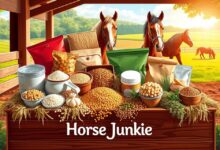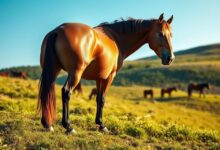Can Horses Eat Grapes? Equine Diet Tips Revealed
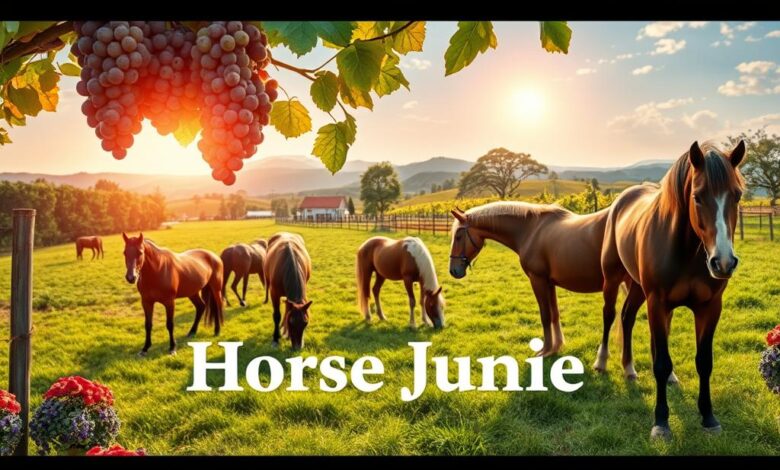
Ever thought about giving grapes to horses? This fruit might seem harmless, but it’s not always good for them. It’s important to know what’s best for our horses’ diets. So, can horses eat grapes? Let’s find out.
We’ll look at how grapes affect their health, the dangers of grape toxicity, and how to safely add human foods to their meals. As horse owners, it’s key to find the right balance for their health.
Key Takeaways
- The recommended intake for grapes is between 10 to 20 grapes per feeding, but moderation is key.
- Horses with insulin resistance should avoid grapes due to their high sugar content.
- Grapes provide hydration, as they consist of about 82% water.
- Start with 1 to 2 grapes when introducing them to your horse’s diet.
- Frozen grapes should be thawed before feeding to prevent dental issues.
Understanding Horse Nutrition
Keeping our horses healthy is key. They need constant access to food for digestion. A balanced diet gives them the nutrients they need to stay strong.
The Importance of a Balanced Diet
A balanced diet is vital for horses. It boosts their health, performance, and life span. The right nutrients help them stay energetic and fight off diseases.
Key Components of Equine Diets
Several parts make up a balanced diet for horses:
- Fiber: Essential for proper digestion and gut health.
- Vitamins and Minerals: Vital for immunity, energy production, and bone health.
- Water: Crucial for hydration, especially in warmer climates.
We must also debunk common myths about feeding horses. Many think fruits and veggies are bad for them. But, knowing the truth lets us add safe treats to their diet.
Can Horses Eat Grapes?
When thinking about feeding grapes to horses, we need to look at both good and bad sides. Many horses like the taste of grapes. But, we must know how they might affect our horses.
Nutritional Benefits of Grapes
Grapes can be a tasty treat for horses, giving them important nutrients. They have vitamins C and K, and potassium, which helps their health. Grapes also have antioxidants, which are good for them. But, we must be careful not to let grape toxicity in horses happen.
Potential Risks of Feeding Grapes
Even though grapes are nutritious, we should ask if are grapes safe for horses? Not every horse can handle them. Some might get sick, like having diarrhea or colic, if they eat too many. There’s also a chance of choking, so we should cut grapes into small pieces. If we’re worried about our horse’s health, it’s best to avoid grapes altogether.
Signs of Horse Dietary Restrictions
Knowing the signs of horse dietary restrictions helps keep our horses healthy. Spotting horse allergies or sensitivities is key to balanced nutrition. Look out for specific signs that your horse might have dietary issues.
Identifying Allergies or Sensitivities
Horses can develop allergies or sensitivities to certain foods. Watch for these signs:
- Unusual coat changes, such as a dull or flaky appearance.
- Weeping eyes or excessive tearing.
- Skin irritations, hives, or swelling.
- Persistent itching or biting at certain areas.
Keep an eye out for these symptoms. They might show that your horse has dietary restrictions. Quick action can help change their diet and ease their discomfort.
Recognizing Digestive Issues
Digestive problems in horses can harm their health. Look for these signs:
- Signs of colic, such as rolling, kicking at the belly, or reduced appetite.
- Changes in manure consistency, including diarrhea or unusually dry feces.
- Frequent or excessive gas, indicated by pawing or looking at the flanks.
- Weight loss or a decline in overall condition.
Keeping a fiber-rich diet is vital for horse digestive health. Forage should be 60-90% of their daily food. Giving them constant access to quality forage helps their digestion.
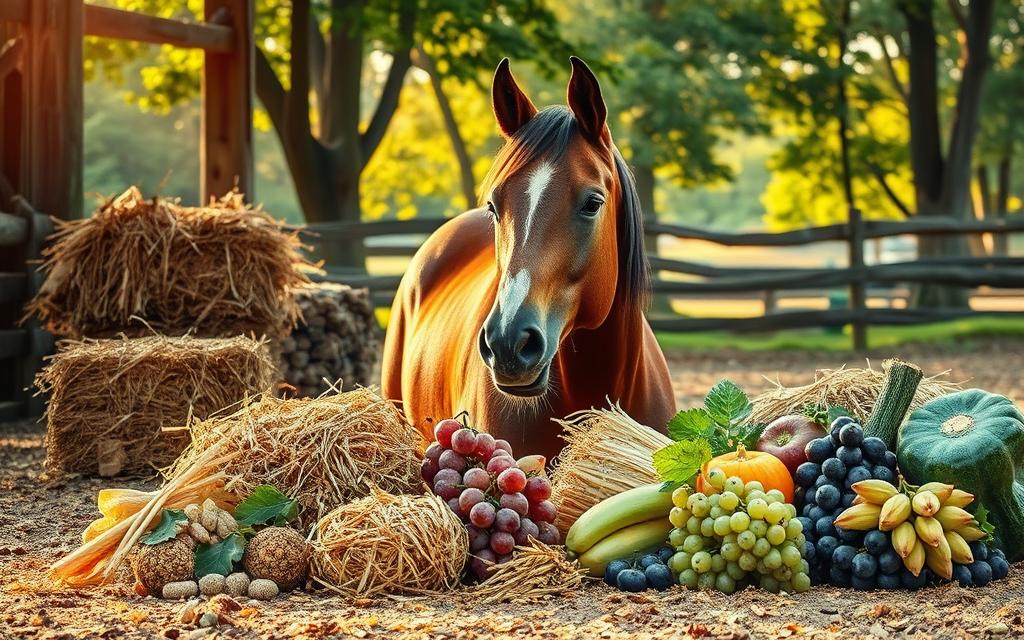
Safe Treat Alternatives for Horses
There are many treats we can give our horses that are not grapes. These treats add fun and nutrition to their diet. It’s important to pick treats that are low in sugar and safe for them.
Fruits Horses Can Enjoy
Many fruits are safe for horses and can be a tasty, hydrating snack. Here are some great options:
- Apples: Always a favorite, sliced apples can be given in moderation.
- Bananas: An energy booster, perfect for racehorses.
- Pineapples: Rich in Vitamin C, these are a refreshing treat.
- Peaches: Sweet and nutritious, providing vitamins and fiber.
- Oranges: Full of Vitamin C; these can be fed whole.
- Pears: Ripe and soft chunks are particularly appealing.
- Cherries: A sweet addition, loaded with vitamins A and C.
- Watermelon: Hydrating and enjoyable, it’s a summer favorite.
Vegetables That Are Safe for Horses
There are also many vegetables that are safe for horses. These can add important nutrients to their diet. Here are some good choices:
- Carrots: A classic with both taste and crunch.
- Celery: Packed with vitamins and minerals, it’s a healthy choice.
- Cucumbers: Crisp and refreshing, these can be given regularly.
- Pumpkins: High in Vitamin A and enjoyed by many horses.
- Radishes: A crunchy treat, ideal for horses that enjoy a variety.
- Green Beans: Nutritious and loaded with benefits when organic.
- Peas: An excellent source of vitamins and minerals.
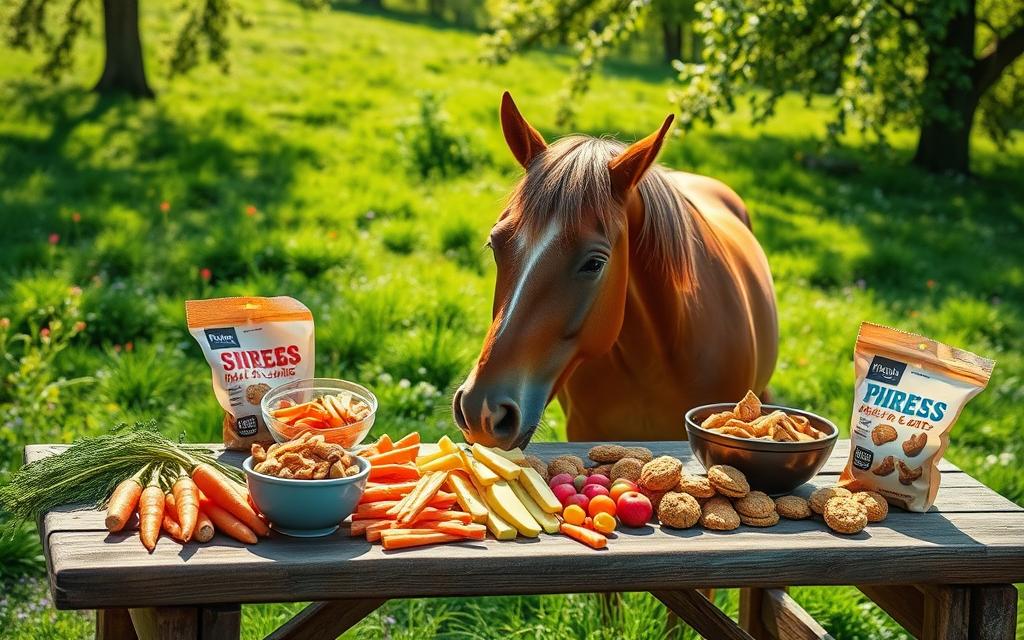
How to Introduce New Foods
Introducing new foods to horses needs careful planning. Gradual changes help them adjust without digestive problems. This approach makes the transition smoother and reduces the chance of bad reactions.
Gradual Introduction Techniques
There are several ways to introduce new foods to horses:
- Start with small portions of the new food, mixing them with familiar items.
- Incorporate the new food into the diet over several days, gradually increasing the quantity.
- Observe our horses during this process, noting any changes in behavior or appetite.
This method helps our horses adjust and lets us watch their reactions closely. For example, when adding grapes, start with a few to make sure they like them and are not uncomfortable.
Monitoring for Reactions
It’s important to watch for any signs of allergies or digestive upset. Look out for:
- Changes in manure consistency.
- Signs of discomfort or colic.
- Unusual lethargy or hyperactivity.
Being vigilant helps keep our horses healthy and lets us make better diet choices. With patience and attention, we can add new treats like grapes to their diet. This improves their overall health and happiness.
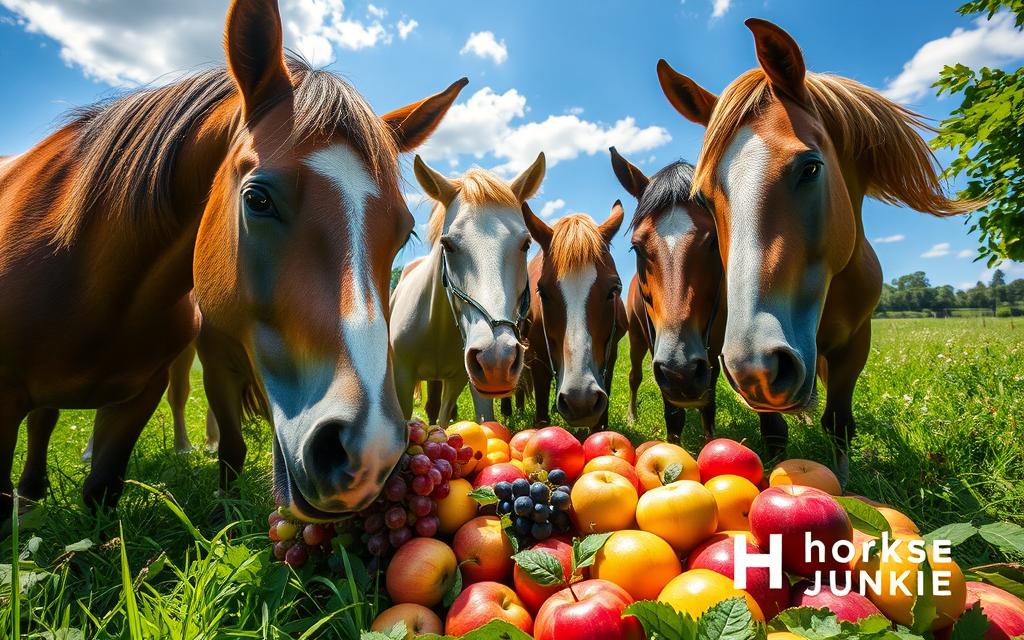
Feeding Grapes: Best Practices
Feeding grapes to horses needs careful thought about serving size and how often to give them. Grapes can be a tasty treat if given right. It’s important to keep our horses safe and healthy when giving them grapes.
Recommended Serving Size
The right amount of grapes for a treat is about 8-10 grapes. They should be seen as an occasional snack, not a regular food. Grapes have a lot of sugar, so we must be careful.
Start with just one or two grapes when first giving them to your horse. Watch how they react. If they’re okay, you can give them a bit more, but always think of their health first.
Frequency of Treats
It’s best to only give grapes as an occasional treat. This keeps their digestive system balanced and prevents health problems. Treats should be a small part of their diet, which should mainly be hay or grass.
Getting advice from a vet is key to making sure grapes fit into your horse’s diet. Every horse is different, and some may not be able to handle grapes well. Following these tips helps us enjoy grapes with our horses safely.
What to Avoid in a Horse’s Diet
We must watch what our horses eat closely. Not all human foods are safe for them. Knowing what’s toxic helps keep our horses healthy.
Toxic Foods for Horses
Here are some foods we should never give to horses:
- Chocolate
- Onions
- Avocados
These foods can harm our horses’ health. They can upset their digestive systems and more.
Harmful Substances to Watch For
There are also harmful substances in a horse’s diet we need to watch out for. These include:
- Caffeine
- Certain grains like corn and oats if fed too much
Eating too much of these can cause stomach problems and other health issues. A balanced diet without these harmful items is key to our horses’ health.
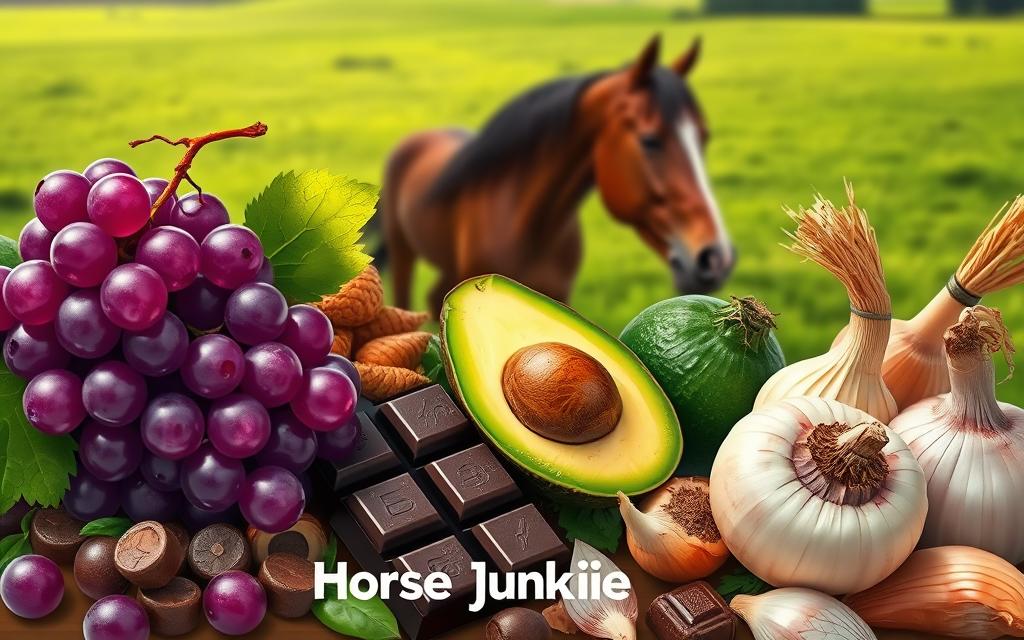
The Role of Veterinary Guidance
Keeping our horses healthy is a big job. We need to know what they need to eat. A vet’s advice is key to making sure our horses get the right food. Knowing when to ask a vet about our horse’s diet is very important.
When to Consult a Veterinarian
There are times when we should get help from a vet. We should call a vet when:
- We see our horse acting strangely or seems uncomfortable.
- We want to add new foods or change their diet a lot.
- Our horse has a health problem that might change what they eat.
- We see signs of stomach trouble or if they’re not eating as much.
Knowing these signs helps us act fast. This way, we can catch any health problems early.
Dietary Adjustments After a Consultation
After talking to a vet, we might need to change our horse’s diet. These changes could be:
- Changing the grains or hay we give them.
- Adding safe fruits or veggies, like apples or carrots.
- Setting up a special eating schedule to help with weight or health.
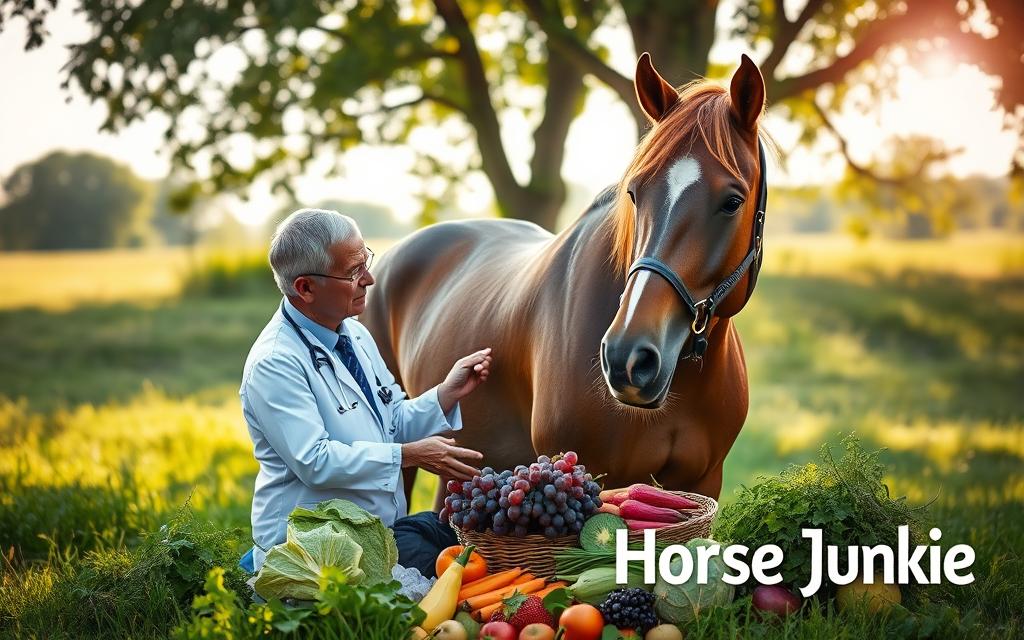
Managing a Horse’s Weight and Health
Keeping a horse at the right weight is key to their health. Using a body condition scoring system helps us check their weight and health. It shows if a horse is too thin, just right, or too heavy.
Regular checks are important for managing a horse’s weight. They help us decide what food they need.
Understanding Body Condition Scoring
Body condition scores for horses range from 1 to 9. Lower scores mean a horse is too thin, and higher scores mean they’re too fat. We check areas like the ribs, neck, and withers to score them.
By watching these scores over time, we can change their diet and exercise. This keeps their nutrition and health balanced.
Nutritional Adjustments for Weight Control
Changing a horse’s diet is crucial for weight management. Using high-fiber, low-sugar foods helps keep them healthy and prevents obesity. Here are some tips for improving their diet:
- Choose high-quality hay over grain to keep fiber levels up.
- Use treats like apples and carrots in small amounts instead of sugary snacks.
- Start them on pasture grazing slowly to avoid weight gain.
- Use body condition scoring to see if diet changes are working and adjust as needed.
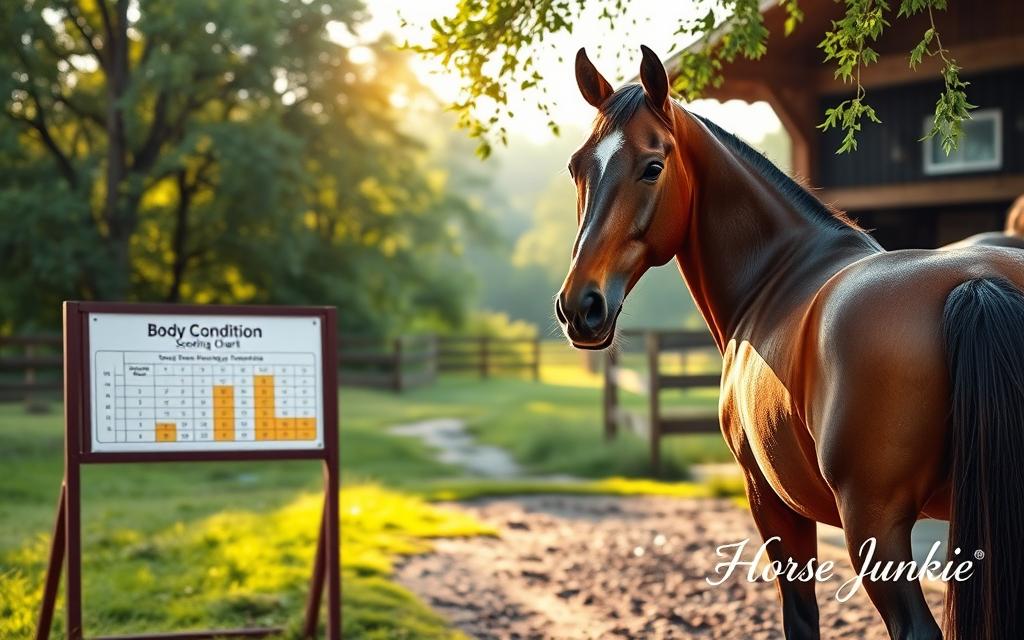
Conclusion: Grapes in a Horse’s Diet
Exploring grapes in a horse’s diet shows the need for balance in their health. Grapes can be a tasty treat if given in small amounts. The conclusion grapes in horse diet highlights the importance of knowing both the good and bad of grapes in their diet.
They are good for hydration but too much can cause obesity and health problems like laminitis.
Final Thoughts on Feeding Grapes
Remember, treats like grapes should be a small part of a horse’s diet, about 10%. This careful approach helps our horses stay healthy and happy. It’s important to watch for signs of toxicity, like tiredness and upset stomach, when giving grapes.
Emphasizing a Balanced Diet
A horse balanced diet includes safe foods like apples, carrots, and bananas. These foods add important nutrients without harming our horses’ health. Our discussions remind us to always learn and be aware of what’s best for our horses.
By making informed choices, we help our horses live happy and healthy lives.
Additional Resources for Horse Owners
Looking to learn more about horse nutrition? There are many resources for horse owners. Books and guides by vets or nutritionists are great for learning. They help us understand our horses’ dietary needs and how to feed them right.
Recommended Reading
There are many books that focus on horse nutrition. They teach us about safe foods for our horses, like carrots and apples. They also warn us about treats that can harm our horses, like pitted fruits.
Online Communities for Equine Nutrition
Online communities are also a great place to learn. They let us share our experiences and get advice. We can talk about feeding our horses and stay up-to-date with new research. It’s a place where we can all learn together and care for our horses better.
FAQ
Can horses eat grapes?
Are grapes safe for horses?
What potential risks are associated with feeding grapes to horses?
How can I introduce grapes to my horse’s diet?
What other fruits are safe for horses?
How often can I feed my horse grapes?
What foods should I avoid feeding my horse?
When should I consult a veterinarian about my horse’s diet?
How can I manage my horse’s weight effectively?
Where can I find more information on horse nutrition?
Source Links
- Can Horses Eat Grapes? – All Important Things You Should Know – heart to horses
- Can Horses Eat Grapes? Pros And Cons
- Can Horses Eat Grapes? A Guide to Feeding Fruits Safely — The Equine Institute
- Can Horses Eat Grapes? Solved!
- Can Horses Eat Grapes? Understanding the Benefits and Risks | Dream Horse
- What fruits and veggies can horses have?
- A Horses Diet: What They Can and Can’t Eat
- Can Horses Eat Grapes?
- What Do Horses Eat? The Ultimate Guide To Horse Diets | Strathorn Farm Stables
- How to Feed a Horse: Understanding the Basic Principles of Horse Nutrition
- Can Horses Eat Grapes? | Strathorn Farm Stables
- What Can Horses Eat? The Top 20 Foods You Didn’t Know Horses Could Eat – Prime Stables
- Can Horses Eat Grapes? | Petoa
- Healthy Treats for Horses
- Can Horses Eat Grapes – Pet Per Plex
- Discover the Joy: Determining the Perfect Quantity of Grapes for Your Horse to Safely Enjoy – heart to horses
- Can Horses Eat Grapes? Nutrition Facts & Info | PangoVet
- What do horses eat? A guide to feeding and watering
- Can Horses Eat Grapes? The Surprising Truth Every Owner Must Know!
- Immediate Effects of Grape Pomace of Horse (Equus Caballus) Fecal Microbiota and pH
- Nutrients for Horses: What’s Trending?
- Acceptable Treats for Foundered Horse
- Odd Things that Horses Eat
- Can Horses Eat Grapes? – National Equine
- Can Horses Eat Grapes? – WhatAboutPets – Everything About Pets
- Can Horses Eat Fruits and Vegetables?
- Trick or Treat: Things to Think About when Giving Your Horse a Treat


